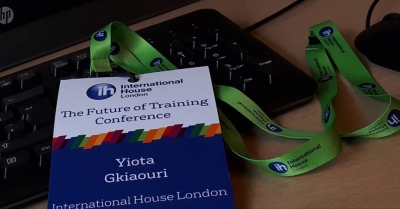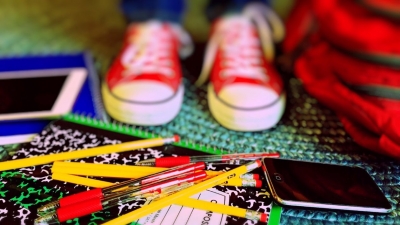My Blog
Short blog posts to communicate ideas, share experiences on language teaching and learning and reflect on the profession overall. Your comments and feedback are highly appreciated.
Sunday, 18 April 2021 11:39
Young Learners: Optimal conditions for language learning
Children learn best when we set a safe and positive learning environment where they are encouraged to experiment and their contributions are acknowledged and valued. As teachers, we might not be responsible for the children’s aptitude towards the language but we can definitely influence their attitude towards it. We don’t want to associate bad experiences with language learning. Creating positive first learning experiences can only lead children into continuing learning in the future. Young learners benefit from multisensory learning.…
Sunday, 04 April 2021 18:23
Reflections on a year of CELTA training
The profile of course participants Most of the people who take a CELTA course are looking for a career change or wish to travel and teach overseas. They usually have zero teaching experience and though during the interview they claim they realize the intensity of the course, they only do so fully once the course gets underway. What you will often hear them say is ‘I was told that it was hard but I never thought it would be…
Monday, 11 November 2019 00:22
'The Future of Training' at IH London - YL & PBL: A framework for self-reflection and self-assessment for learners and teachers
On the 9th of November I had the pleasure of giving a talk at the ‘Future of Training’ at IH London. I had the chance to meet a bunch of highly motivated teachers and trainers and share ideas and beliefs. Among the things we discussed was how PBL can help students produce tangible results that they can relate or apply to their lives but also how we can convince teachers to adopt new methods and approaches. Below you can…
Sunday, 20 October 2019 14:24
Understanding learners' Silent Period. Maximizing learning through TPR activities.
Total Physical Response (TPR) is an approach to second language teaching that was developed in the 1970s by James Asher who saw a resemblance between first and second language acquisition. Asher noticed that children acquire their mother tongue mainly by observing their surroundings, listening to adults telling them what to do and performing actions accordingly without, however, speaking. For example, the parent says: ‘Give me the book’ and the children do so. Similarly, in the early stages of second language…
Sunday, 11 March 2018 22:32
Project Based Learning and Teenagers. Demanding but rewarding. (An authentic one-week course with plan of work, materials and photos/slides from the lessons)
Anyone who has taught teenagers knows that they come with their own teaching challenges, such as lack of interest, poor discipline, scant attention and frequent mood swings. Teachers might work their fingers to the bones and still come up against a brick wall. Teaching teenagers is undeniably hard work and therefore they are not usually welcomed by most teachers. However, before we get our pitchforks ready and label them as lazy and uncooperative, we, as teachers, ought to make an…
Wednesday, 03 January 2018 19:55
Lost in Lesson Planning? Rise to the challenge.
I'm glad I have contributed to Travel Everywhere - Earn Anywhere blog. Here's my guest post on lesson planning,https://traveleverywhere-earnanywhere.com/2018/03/23/lost-in-lesson-planning-heres-what-you-need-to-know
Monday, 30 October 2017 18:00
The Introverted Teacher: A curse or a blessing?
Teaching is a highly social profession that, besides lesson planning, requires constant interaction with students, colleagues and parents. So, one can easily assume that teaching might not be a wise career choice for an introvert. People often get that impression because they tend to associate introversion with shyness. However, introverts are not the kind of people who appear to be distant because they don’t enjoy getting into conversations. In fact, they do enjoy the company of others and the…
Sunday, 22 October 2017 23:25
Project Based Learning & Young Learners: Challenging but possible. (An authentic one week course with plan of work, materials and photos from the lessons)
In a previous blogspot http://eltea.org/blog/how-to-implement-project-based-learning-in-your-esl-classroom I have presented the framework of a project based course and how it can build bridges between the classroom and the real world. One of the main arguments against project based courses is that they cannot be applied to young learners as their cognitive framework and thinking capacity are still in the process of development. Teachers sometimes get frustrated when they have to plan a course that will revolve around a real world challenge and…
Wednesday, 27 September 2017 00:05
Icebreakers: It's that time of the year again!
It’s that time of the year again when teachers flip through their notes or browse through the Internet in search of the best icebreakers to kick off the new school year. Icebreakers can be an effective way to get to know each other in a new group and they are often used on the first day of a new course. When they are used in moderation, they can create a sense of community and establish a more relaxed and positive…
Monday, 28 August 2017 20:36
How to implement Project Based Learning in your ESL classroom
Project based learning (PBL) Project based learning (PBL) is an inquiry-based method where students use language to tackle and solve real-world problems/tasks within a given amount of time. Most teachers tend to relate PBL to TBL and though both of them are very much alike, there is a distinct difference. In PBL the task becomes the focal point, not of a lesson, but of a whole course which could range from one week to a whole term. Though PBL stands…
More...
Sunday, 02 July 2017 21:47
Language Experience Approach (LEA): Bringing real life experiences into the classroom.
The LEA is a whole language approach that came about for the development of reading skills and aims primarily at learners with literacy needs. LEA uses students’ own language in order to generate materials that will later be read by those same students. It can be used both with individuals or groups. The learners recount a personal experience or a story to their teacher who then reformulates what the student has said into full sentences in order to create…











